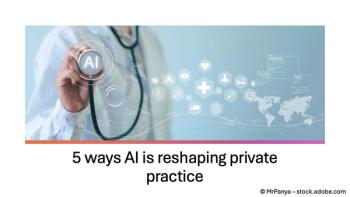
Implement an EHR the Right Way
Primary-care doc and long-time EHR user Robert Lamberts outlines common EHR implementation mistakes and offers tips for success.
EHR implementation in a private practice setting - especially a small practice - can be difficult. A small practice is essentially a small business, and the top priority of any business is to have enough money to operate. Only those who have lived through the month-to-month pressures of running a small practice can truly grasp why EHR implementation is so challenging in this setting.
But take heart! It can be done. Before you jump in with both feet consider these common mistakes first:
Buying the wrong EHR - The most important element of choosing an EHR is doing thorough research first. Ultimately, you should pick a product that you will really use and that will improve your practice’s efficiency.
Not having clear goals - If you are implementing an EHR to get the $40,000 bonus from the government, that is not a good reason. You can lose far more than that with a bad implementation. Ask yourself first, “What benefits can an EHR bring to my practice?”
Underestimating the task - Most vendors make implementing an EHR sound easy. It isn’t. To reap the full benefits of an EHR, you have to plan carefully, consult experts, and enlist the buy-in of your staff and fellow physicians.
Tips for success
My definition of a successful EHR implementation is one that does not bankrupt your practice, frustrate patients and staff, or significantly reduce productivity. Your goal is to continue your daily operations as close to normal as possible. Here are some tips that can help you soldier through the initial challenges to implementation:
Focus on easy gains first - The biggest advantage of an EHR is that information is easy to access from anywhere. All labs, consult notes, radiology reports, and office notes are in a single place and accessible from any location. The hardest part of using an EHR is getting that information into the patient record - especially the office notes. Instead of first trying to use your EHR for data input, optimize data retrieval by doing the following:
- Interface with any labs you use;
- Develop a system to scan in all radiology and consultation reports; and
- If you can, get the local hospital to send important documents, such as discharge summaries and surgical reports, electronically to your EHR.
Emphasize efficiency
- One of our practice’s greatest efficiency tools is the laminated review-of-system sheets we give to each patient when they are put into an exam room. They circle their complaints on the form using an erasable pen, and the physician uses that as a worksheet for the visit. It is cheap, easy, and nonelectronic. Sometimes the easiest solution is low tech.
Implementation is a process, not an event - We have been using an EHR for nearly 13 years, and we are still implementing changes to our processes. Don’t feel pressured to do it all at once.
Pilot big changes - Implementing in stages will help you avoid big disasters. We have a few physicians in our practice who are more tolerant of change and more adept at using the EHR. Whenever possible, we let these “power” users implement first, working out the bugs before the less “techie” docs are brought on board.
Our practice is not only successfully using an EHR, but the personal income of our physicians has gone up during a time when for many it is doing the opposite. We are not doing this despite our EHR; we are doing this because of our EHR. Used properly, it can be a powerful tool for efficiency and produce better quality of care for patients.
Robert Lamberts, MD, is board-certified in internal medicine and pediatrics, and practices in Augusta, Ga. His practice won the 2003 Davies Award for outstanding application of IT in a primary-care setting. He authors the popular medical blog “Musings of a Distractible Mind,”
This article originally appeared in the June 2010 issue of Physicians Practice.
Newsletter
Optimize your practice with the Physicians Practice newsletter, offering management pearls, leadership tips, and business strategies tailored for practice administrators and physicians of any specialty.






